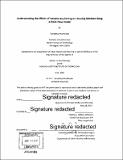| dc.contributor.advisor | William Wheaton. | en_US |
| dc.contributor.author | Mukherjee, Devaditya | en_US |
| dc.contributor.other | Massachusetts Institute of Technology. Department of Urban Studies and Planning. | en_US |
| dc.date.accessioned | 2017-09-15T15:33:45Z | |
| dc.date.available | 2017-09-15T15:33:45Z | |
| dc.date.copyright | 2017 | en_US |
| dc.date.issued | 2017 | en_US |
| dc.identifier.uri | http://hdl.handle.net/1721.1/111428 | |
| dc.description | Thesis: M.C.P., Massachusetts Institute of Technology, Department of Urban Studies and Planning, 2017. | en_US |
| dc.description | Cataloged from PDF version of thesis. | en_US |
| dc.description | Includes bibliographical references (page 58). | en_US |
| dc.description.abstract | In this thesis I demonstrate how different housing markets would react to an exogenous shock of inclusionary zoning. I develop a stock-flow model of housing based on the model presented in Wheaton (1999). In this model, the degree of durability, elasticity of supply of new construction, and rental elasticity of demand of housing can vary. Various experiments were conducted to understand the dynamic behavior of different (hypothetical) housing markets after the introduction of an inclusionary zoning shock. The above mentioned study is supplemented with an analysis of Boston's inclusionary development program, and its impact on the residual land values. Detailed financial analysis was undertaken for three prototypical projects, to study how residual land values would change for varying levels of inclusionary zoning requirements. The overarching goal of the thesis is to add to the existing literature on the economics of inclusionary zoning, and to produce material of pedagogical value for students of urban planning and real estate, and also relevant policy makers. | en_US |
| dc.description.statementofresponsibility | by Devaditya Mukherjee. | en_US |
| dc.format.extent | 58 pages | en_US |
| dc.language.iso | eng | en_US |
| dc.publisher | Massachusetts Institute of Technology | en_US |
| dc.rights | MIT theses are protected by copyright. They may be viewed, downloaded, or printed from this source but further reproduction or distribution in any format is prohibited without written permission. | en_US |
| dc.rights.uri | http://dspace.mit.edu/handle/1721.1/7582 | en_US |
| dc.subject | Urban Studies and Planning. | en_US |
| dc.title | Understanding the effects of inclusionary zoning on housing markets using a stock-flow model | en_US |
| dc.type | Thesis | en_US |
| dc.description.degree | M.C.P. | en_US |
| dc.contributor.department | Massachusetts Institute of Technology. Department of Urban Studies and Planning | |
| dc.identifier.oclc | 1003292373 | en_US |
